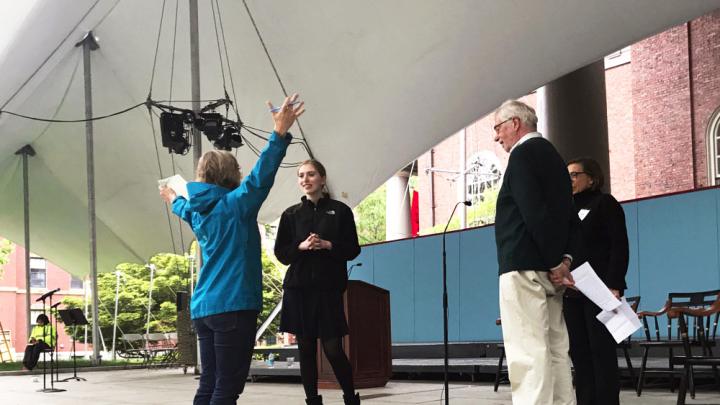As newcomers to a Crimson graduation may not realize, the prize speaking parts in the morning ceremony belong to students. (The adults—President Drew Faust and the youngish adult Mark Zuckerberg, Facebook’s CEO—must wait until after lunch for their turn.) The 2017 cohort includes Mather House resident Jessica (Jessi) Rachael Glueck ’17 (the Latin salutatory and its English translation); Auguste (Gussie) Jennings Roc ’17 (the Senior English Address); and Walter Edward Smelt III, M.T.S. ’17, coincidentally representing Harvard Divinity School at the end of its bicentennial-year celebration (the Graduate English Address). They are profiled below, and in the Gazette.
They convened for a rehearsal just after 5:00 p.m. on Monday, on the platform at the renovated Memorial Church—minus only their caps and gowns (and six-thousand-plus fellow graduates-to-be, plus honored guests, and adoring, patient relatives and friends); and plus North Face and Marmot jackets, sweaters, and a lumberjack shirt to ward off the chill, while the tent overhead deflected showers. Under the watchful eye of University Marshal Jackie O’Neill and coach R. J. Tarrant, Pope professor of the Latin language and literature (see this legacy article on his role), they proved to be a confident, accomplished trio of speakers. Undeterred by the roar of lift trucks installing Commencement equipment, and the sound technicians installing gear behind them, Glueck, Roc, and Smelt were expressive, emphatic in gesture, and startlingly unruffled. A very good sign of things to come during the Morning Exercises May 25.
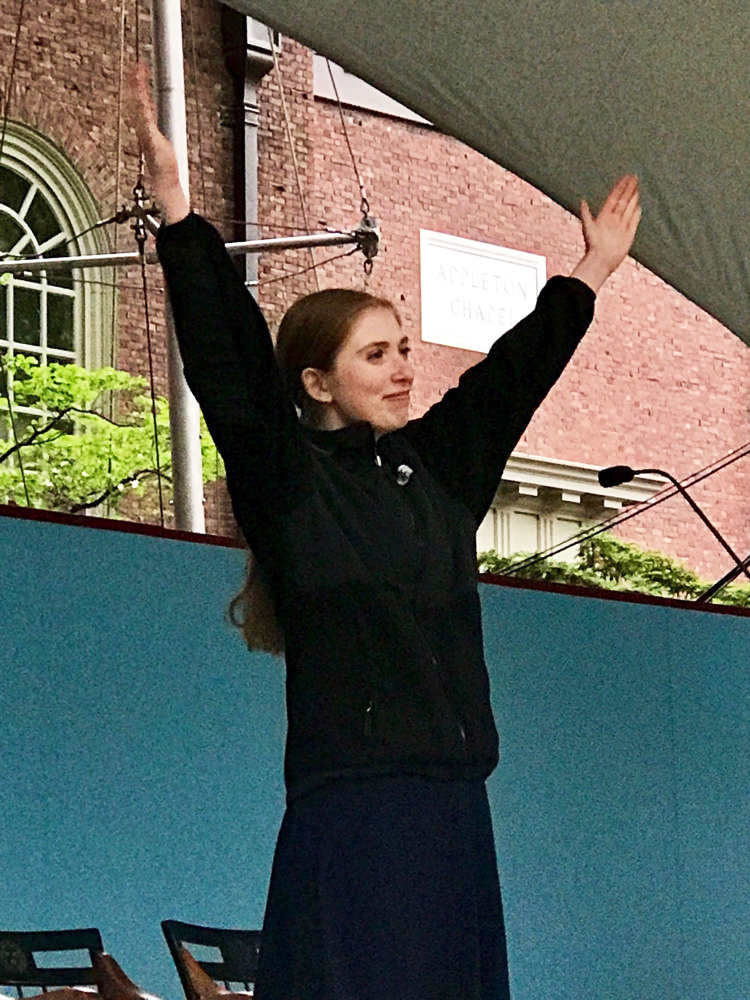
The expressive Jessica Glueck
Photograph by LC/Harvard Magazine
Latin Salutatorian Jessica Glueck
At first glance, Jessica Glueck, of Kansas City, Kansas, appears to be that rare species: a Latin orator who did not concentrate in the classics. But her English thesis, “George Eliot and the Unmaking of Myth,” provides a clue. As she explained it, her scholarship provided a fresh reading of the allusion to classical mythology in the relatively little-read Romola, an historical novel set in fifteenth-century Florence. In Glueck’s reading, the allusions are not so much allegorical as ways into the characters’ inner lives.
As it happens, Glueck indulged in plenty of classics courses both in high school and during her Harvard years—and next fall, with help from a Harvard fellowship, heads off to Oxford, where she will pursue a master’s in the field, focusing on nineteenth-century authors who incorporated classical antiquity into their works, and on associated scholarship on the classics. During the summer, she will be teaching locally, in Roxbury and Chelsea, as part of her training as a Harvard Teacher Fellow. (“Educating Teachers,” from the November-December 2016 magazine, dives deep into this training program for undergraduate-teachers-to-be.) Following her year in Oxford, where she also hopes to teach Latin in elementary and middle-school classrooms, Glueck returns to her training, en route to a planned career teaching English and Latin in a U.S. high school.
In whatever spare time she had, Glueck was co-editor in chief of Brevia, the very attractive journal that aims to make undergraduate research widely accessible, through news reports, interviews, and features across the disciplines. She also served as a tutor in the writing center. (Those future high-school pupils would be well advised to allot time to revise any papers they write for Glueck, rather than submitting slapdash drafts and hoping for the best.)
Glueck described herself as “incredibly grateful” for the opportunity to speak, and noted the confluence of themes in “a Jewish woman giving the Latin oration at Harvard Commencement.” Among the listeners who took special pleasure in her address was Tarrant; recalling the many classes she took with him, Glueck called him “the person who made me fall in love with Latin here.”
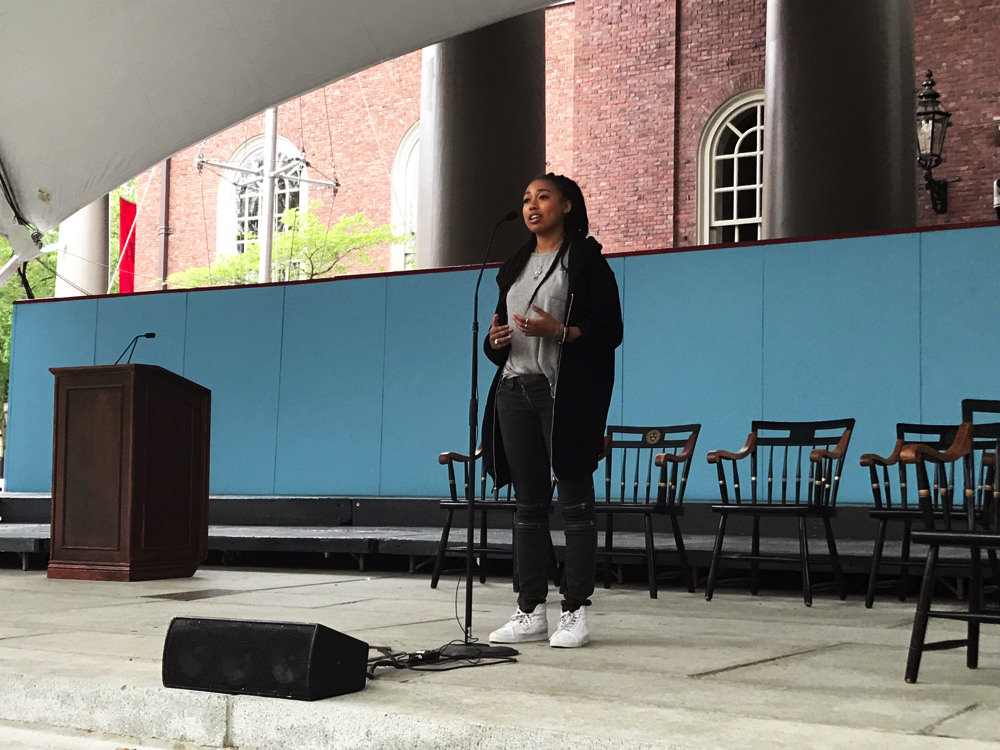
Senior English orator Gussie Roc
Photograph by Lydia Carmichael/Harvard Magazine
Senior English Orator Gussie Roc
Gussie Roc had epochal events on her mind for her speech. More immediately, she thought about “the kinds of people who are here,” whom she called “just unparalleled.” Among them was her best friend and Pforzheimer Housemate Joshuah Brian Campbell ’16—last year’s Senior English orator. She marveled about the opportunity to hear “world-changers” like former Vice President Biden, Zuckerberg, and U.S. Representative John Lewis, LL.D. ’12 (the pioneering civil-rights leader, who appeared on campus last year when Harvard made note of its past connections to slavery, and again this year for a Kennedy School honor; he was in New Haven Monday receiving a Yale honorary degree).
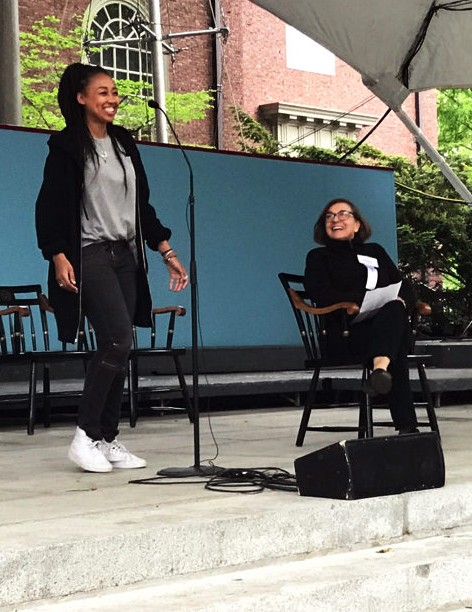
Gussie Roc and University Marshal Jackie O'Neill during rehearsal May 22
Photograph by Lydia Carmichael/Harvard Magazine
Roc, a history and literature concentrator, was involved with the freshman arts program throughout her College career, first as a prefrosh and then as a proctor in the program for the Harvardians who matriculated after her; she puts the arts at the center of her life. She also served as co-director of the Harvard College Film Festival, founded in 2014, with a special interest in the intersection of film, social justice, humanitarian issues, and entertainment—an activity that engaged her with the Harvard Art Museums and with faculty members such as Elizabeth Hinton, assistant professor of history and of African and African American studies, whose research involves social issues such as mass incarceration. “I loved helping to build this new organization,” Roc said. And she was involved with a venerable one, too, serving as president of the Signet Society, the 147-year-old gathering place for community members interested in the arts and letters.
For now, Roc expects to return to New York to explore opportunities in film, media, and writing, bearing on social justice. She will have a summer excursion to Japan, where she will teach academic writing and performing arts. She leaves behind a narrative of personal experiences tied to two events that shook, and shaped, twenty-first-century America.
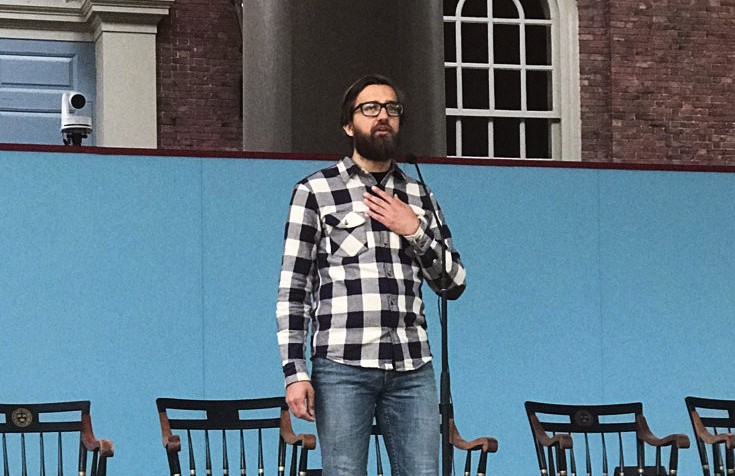
Graduate English orator Walter Smelt, representing the Divinity School at the end of its celebratory bicentennial year
Photograph by Lydia Carmichael/Harvard Magazine
Graduate English Orator Walter Smelt
Walter Smelt thought about bewilderment and humility—intellectual and moral, in the context of a higher education—in preparing his Graduate English Address. The native of West Palm Beach is now a reverse snowbird, having spent much of the past decade in and around Boston.
After studying religion and literature at Boston University, he taught, did odd jobs, and earned an M.F.A. in creative writing at the University of Florida, among other engagements, before enrolling in Harvard Divinity School’s M.T.S. program, which has a religion, literature, and culture track. His aim, Smelt said, was to further study important texts from “traditions that have shaped the world we live in for thousands of years.” He also enrolled in poetry workshops in the Faculty of Arts and Sciences’ English department—combining his dual interests in teaching creative writing at the college level, while writing and publishing his own poems. (In some future career, should he choose to follow fellow divinity students into some sort of ministry, he would be terrific in front of a congregation.)
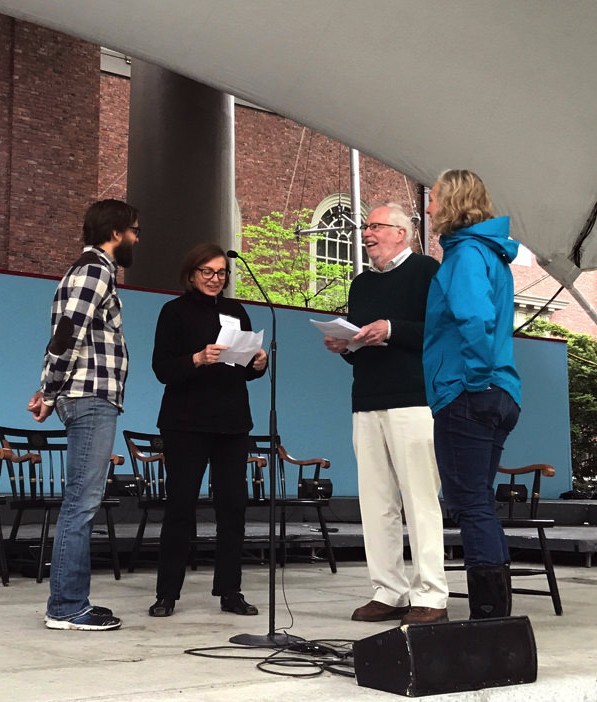
Walter Smelt reviewing his rehearsal presentation on the Commencement stage on May 22, advised by Jackie O’Neill, R. J. Tarrant, and Erika Bailey
Photograph by Lydia Carmichael/Harvard Magazine
He sought the speaking part, he said, because “It seemed important to say a word for uncertainty in the world. Especially at an elite institution like Harvard, there can be a tendency to go away overconfident.” In his own mind, that uncertainty is tightly connected to the need for compassion and ethical engagement with the world. The divinity school’s concerns naturally involve “mysteries” and the inherent limitations in human beings’ attempt to answer big, unresolvable questions—and the necessity of pursuing them. The time seemed especially ripe to do so, he said, in the wake of last November’s presidential election, when so much “accepted wisdom has been overturned.”
Smelt is “really proud to rep for the divinity school in this auspicious year,” at the end of its bicentennial celebration. A frequent joke, he noted, is that the school is at the farthest edge of campus, so it is pleasing to have it and its subject “at the center [of Harvard] for a few minutes.” In the resulting remarks, he said, he is both addressing the whole audience and, “In some sense…talking to myself…too, and reminding myself to strive for a better world with a healthy sense of humility.”
